
Hiram Warren Johnson was an American attorney and politician who served as the 23rd governor of California from 1911 to 1917. Johnson achieved national prominence in the early 20th century. He was elected in 1916 as the United States Senator from California, where he was re-elected to five terms and served until his death in 1945.

William Dennison Stephens was an American federal and state politician. A three-term member of the U.S. House of Representatives from 1911 to 1916, Stephens was the 24th governor of California from 1917 to 1923. Prior to becoming Governor, Stephens served as the 27th Lieutenant Governor of California from 1916 to 1917, due to the death of John Morton Eshleman, and served a brief time as Mayor of Los Angeles in 1909 due to the resignation of Arthur C. Harper.

James Norris Gillett was an American lawyer and politician. A Republican involved in federal and state politics, Gillett was elected both a member of the U.S. House of Representatives from California from March 4, 1903, to November 4, 1906, and as the 22nd governor of California from January 9, 1907, to January 3, 1911.
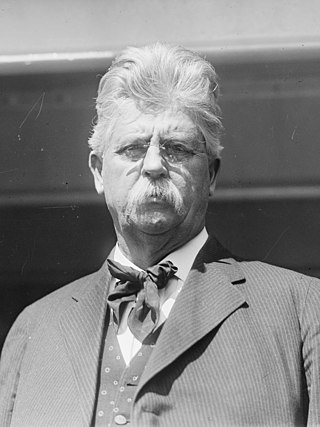
Henry Tifft Gage was an American lawyer, politician and diplomat. A Republican, Gage was elected to a single term as the 20th governor of California from 1899 to 1903. Gage was also the U.S. Minister to Portugal for several months in 1910.

George Cooper Pardee was an American doctor of medicine and politician. As the 21st Governor of California, holding office from January 7, 1903, to January 9, 1907, Pardee was the second native-born Californian to assume the governorship, after Romualdo Pacheco, and the first governor born in California after statehood.
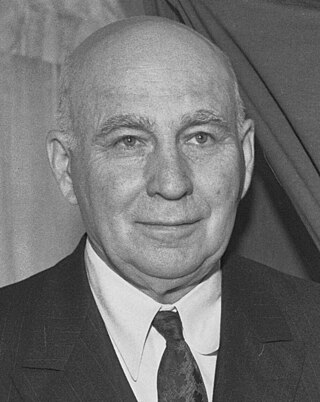
Frank Finley Merriam was an American Republican politician who served as the 28th governor of California from June 2, 1934, until January 2, 1939. Assuming the governorship at the height of the Great Depression following the death of Governor James Rolph, Merriam defeated Democratic nominee Upton Sinclair in the 1934 election. Merriam also served as the State Auditor of Iowa from 1900 to 1903, and served in both the Iowa and California state legislatures.

Theodore Arlington Bell was an American lawyer and politician who served one term as a Democratic Congressman from California from 1903 to 1905.

The 1918 California gubernatorial election was held on November 5, 1918. William Stephens had defeated James Rolph for the Republican nomination.

The 1910 California gubernatorial election was held on November 8, 1910. It saw Republican Hiram Johnson elected as the state's governor. Johnson, the favored candidate of the progressive faction of the GOP and the Lincoln–Roosevelt League, had defeated Charles F. Curry and Alden Anderson in the primary for the Republican nomination.
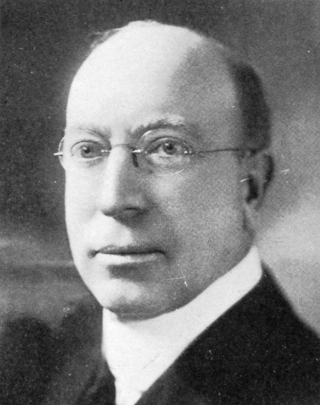
William Henry Langdon was an American banker, lawyer and Associate Justice of the California Supreme Court from January 4, 1927, to August 10, 1939.

The 1902 California gubernatorial election was held on November 4, 1902, to elect the governor of California. George Pardee won the election with 48.06% percent of the popular vote and was the Governor of California until 1907.
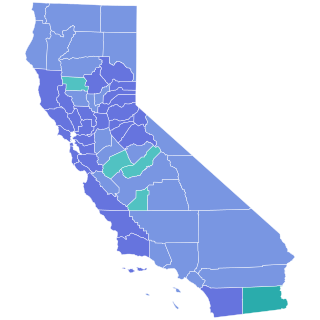
The 2018 California lieutenant gubernatorial election was held on November 6, 2018, to elect the Lieutenant Governor of California. Incumbent Democratic lieutenant governor Gavin Newsom was ineligible to run for reelection due to term limits and ran for Governor of California instead. Democrats Eleni Kounalakis and Ed Hernandez faced each other in the general election, as no Republican finished in the top two positions of the nonpartisan blanket primary that was held on June 5, 2018.
The Sacramento Valley Development Association was a quasi-public entity of colony land developers founded in 1900 to advance the area's political and commercial interests as well as market its agricultural products. The organization, headquartered in Sacramento, was founded by 6 counties but came to comprise representatives from 6 more, each selected by their respective county supervisor. It remained operational and influential until 1925 when the Sacramento Valley Regional Advisory for the larger California Development Association filled the void.

The 2024 United States Senate elections in California will be held on November 5, 2024, to elect a member of the United States Senate to represent the state of California. There will be two ballot items for the same Class 1 seat: a special election to fill the seat for the final weeks of the 118th United States Congress, and a general election for a full term that starts on January 3, 2025, starting in the 119th United States Congress. California uses a nonpartisan blanket primary, in which all candidates regardless of party affiliation appear on the same primary ballot and the two highest-placing candidates advance to the general election.

The 2022 California gubernatorial election was held on November 8, 2022, to elect the governor of California, with the statewide top-two primary election taking place on June 7, 2022. Incumbent Democratic Party Governor Gavin Newsom was re-elected to a second term after surviving a recall election in 2021, during his first term.
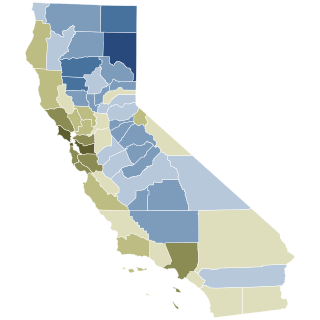
The 2021 California gubernatorial recall election was a special recall election that began in August 2021 and concluded on September 14, 2021, when California voters chose not to recall incumbent Democratic Governor Gavin Newsom, elected for the term January 2019 to January 2023.

The 2022 California State Controller election was held on November 8, 2022, to elect the California State Controller. Due to strict absolute lifetime term limit laws, incumbent Democratic State Controller Betty Yee was ineligible to run for a third term. Democrat Malia Cohen won the election, defeating Republican Lanhee Chen. Despite Chen's loss, the race was the closest of the 2022 elections in California and Chen received more votes than any Republican candidate in the 2022 national election cycle. Chen flipped ten counties, also the most any candidate flipped in California.

The 2024 California State Assembly election will be held on Tuesday, November 5, 2024, with the primary election being held on March 5, 2024. All of the seats of the California State Assembly will be elected as part of the 2024 California elections.

The 2024 California State Senate election will be held on Tuesday, November 5, 2024, with the primary election being held on March 5, 2024. Voters in the 20 odd-numbered districts of the California State Senate will elect their representatives. The elections will coincide with the elections for other offices, including the state Assembly.

The 2024 United States House of Representatives elections in California will be held on November 5, 2024, to elect the 52 U.S. representatives from the State of California, one from all 52 of the state's congressional districts. The elections will coincide with the 2024 U.S. presidential election, as well as other elections to the House of Representatives, elections to the United States Senate, and various state and local elections.























